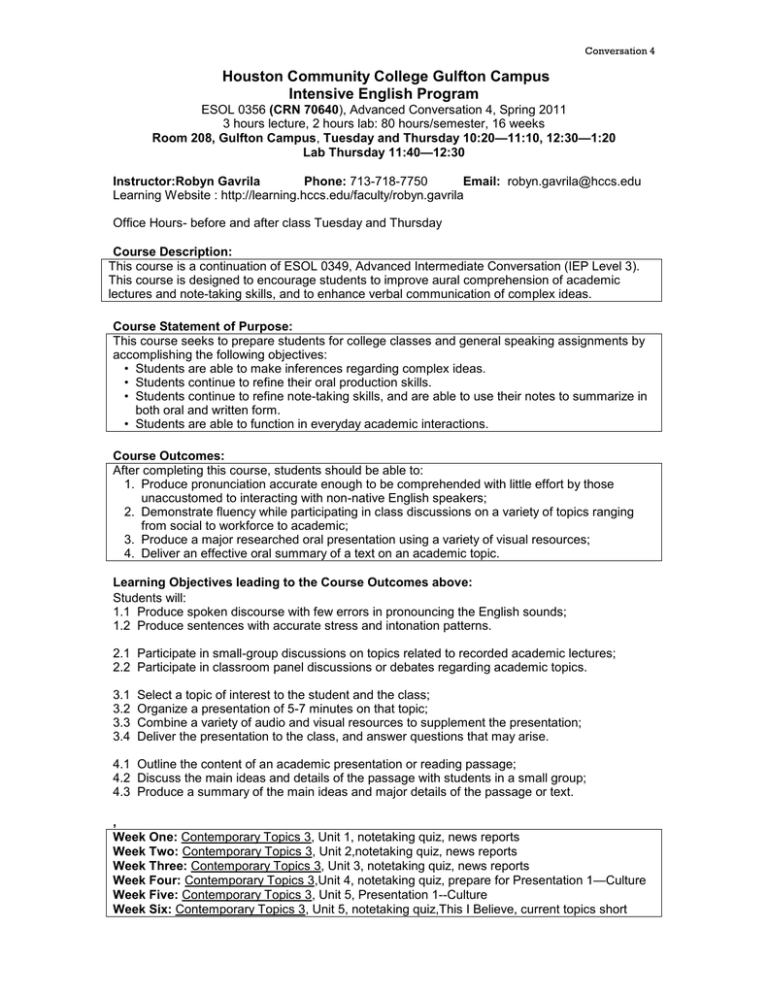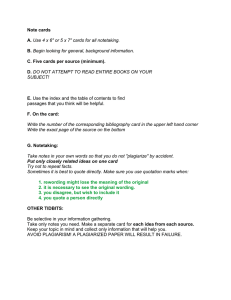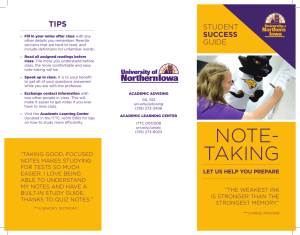conversation 4 new.doc
advertisement

Conversation 4 Houston Community College Gulfton Campus Intensive English Program ESOL 0356 (CRN 70640), Advanced Conversation 4, Spring 2011 3 hours lecture, 2 hours lab: 80 hours/semester, 16 weeks Room 208, Gulfton Campus, Tuesday and Thursday 10:20—11:10, 12:30—1:20 Lab Thursday 11:40—12:30 Instructor:Robyn Gavrila Phone: 713-718-7750 Email: robyn.gavrila@hccs.edu Learning Website : http://learning.hccs.edu/faculty/robyn.gavrila Office Hours- before and after class Tuesday and Thursday Course Description: This course is a continuation of ESOL 0349, Advanced Intermediate Conversation (IEP Level 3). This course is designed to encourage students to improve aural comprehension of academic lectures and note-taking skills, and to enhance verbal communication of complex ideas. Course Statement of Purpose: This course seeks to prepare students for college classes and general speaking assignments by accomplishing the following objectives: • Students are able to make inferences regarding complex ideas. • Students continue to refine their oral production skills. • Students continue to refine note-taking skills, and are able to use their notes to summarize in both oral and written form. • Students are able to function in everyday academic interactions. Course Outcomes: After completing this course, students should be able to: 1. Produce pronunciation accurate enough to be comprehended with little effort by those unaccustomed to interacting with non-native English speakers; 2. Demonstrate fluency while participating in class discussions on a variety of topics ranging from social to workforce to academic; 3. Produce a major researched oral presentation using a variety of visual resources; 4. Deliver an effective oral summary of a text on an academic topic. Learning Objectives leading to the Course Outcomes above: Students will: 1.1 Produce spoken discourse with few errors in pronouncing the English sounds; 1.2 Produce sentences with accurate stress and intonation patterns. 2.1 Participate in small-group discussions on topics related to recorded academic lectures; 2.2 Participate in classroom panel discussions or debates regarding academic topics. 3.1 3.2 3.3 3.4 Select a topic of interest to the student and the class; Organize a presentation of 5-7 minutes on that topic; Combine a variety of audio and visual resources to supplement the presentation; Deliver the presentation to the class, and answer questions that may arise. 4.1 Outline the content of an academic presentation or reading passage; 4.2 Discuss the main ideas and details of the passage with students in a small group; 4.3 Produce a summary of the main ideas and major details of the passage or text. , Week One: Contemporary Topics 3, Unit 1, notetaking quiz, news reports Week Two: Contemporary Topics 3, Unit 2,notetaking quiz, news reports Week Three: Contemporary Topics 3, Unit 3, notetaking quiz, news reports Week Four: Contemporary Topics 3,Unit 4, notetaking quiz, prepare for Presentation 1—Culture Week Five: Contemporary Topics 3, Unit 5, Presentation 1--Culture Week Six: Contemporary Topics 3, Unit 5, notetaking quiz,This I Believe, current topics short Conversation 4 speech Week Seven: Contemporary Topics 3, Unit 6, notetaking quiz, This I Believe, current topics short speech Week Eight: Contemporary Topics 3, Unit 7, notetaking quiz, This I Believe, current topics short speech Week Nine: The Donner Party sections 1—4, notetaking quiz, Presentation 2—This I Believe Week Ten: The Donner Party sections 5—8, notetaking quiz, news report Week Eleven: The Donner Party sections 9—12, notetaking quiz, news report Week Twelve: Contemporary Topics 3, Unit 8, notetaking quiz, prepare for Presentation 3— Debate on U.S. Systems Week Thirteen: Comtemporary Topics 3, Unit 10, notetaking quiz,Presentation 3, news report Week Fourteen: Contemporary Topics 3, Unit 11, notetaking quiz, news report Week Fifteen: Contemporary Topics 3, Unit 12, notetaking quiz, news report Week Sixteen: Final listening and speaking examination Instructional Methods: ESOL 0356 is the final Conversation course in the Intensive English curriculum. It aims to prepare students to be able to benefit from and succeed in their future Developmental and Academic courses in HCC and/or university work, in the areas of listening comprehension, spoken comprehensibility, and oral summarizing. As such, the methods of learning will depend partly on lecturing by the instructor, but even more of the time will be taken up by students’ applying the instruction through practice in speaking and listening: discussing, reporting, making presentations, listening, testing on listening, and summarizing. Student requirements and assignments: • Good attendance, on time • Turn off cell phones in the classroom • Complete all homework and classwork, including lab assignments • Give three oral presentations • Complete three listening examinations Grading: Activities and participation International Conversation Partners, Service Learning or Open Lab assignments Listening quizzes and exams Oral presentations Final examination 20% 10% 25% 25% 20% Total Instructional Materials: English-English dictionary: Oxford Advanced Learner’s Dictionary Longman Dictionary of American English A 3-ring binder, dividers, and lined paper A computer flash drive 100% OR HCC Policies: Services to students with disabilities: Students with a learning or physical disability which might affect their performance in class should contact the HCCS disabilities counselor, Dr. Becky Hauri, at (713) 718-7781. Academic dishonesty: Any form of copying, cheating, or plagiarism will result in a grade of 0 for the assignment. The instructor will decide whether to permit you to make up the work, and under what circumstances it might be made up. If you are charged with academic dishonesty, pleading ignorance of the rules will not help you. Penalties and/or disciplinary proceedings may be initiated by HCC officials against a student who is accused of scholastic dishonesty. “Scholastic dishonesty” includes, but is not limited to, cheating on a test, plagiarism, and Conversation 4 collusion. Cheating on a test includes: Copying from another students’ test paper; Using materials not authorized by the person giving the test; Collaborating with another student during a test without authorization; Knowingly using, buying, selling, stealing, transporting, or soliciting in whole or part the contents of a test that has not been administered; Bribing another person to obtain a test that is to be administered. Plagiarism means the appropriation of another’s work and the unacknowledged incorporation of that work in one’s own written work offered for credit. Collusion means the unauthorized collaboration with another person in preparing written work offered for credit. Possible punishments for academic dishonesty may include a grade of 0 or F in the particular assignment, failure in the course, and/or recommendation for probation or dismissal from the College System. See the HCCS Student Handbook for further information. Attendance: No absences are excused, and anyone who misses more than ten hours of class (including lab) may be dropped from the class, and if so, will be dropped from all of the Intensive English classes you are taking this semester. This can have serious consequences for F1 students. Please let your instructor know (in advance, if possible) if you have to be absent. When absent, you are responsible for finding out what you missed, and for asking permission to make up the work. Tardiness: Please come to class on time. If you miss more than ___ minutes of class, you will be counted absent for that hour of class. Withdrawals: The last day students can withdraw or be dropped from a class with a grade of “W” is 14 April at 4:30 p.m. If you decide to drop, you must contact an advisor or your professor for approval, and this must be done prior to the drop deadline of 4/14. Students who have excessive absences after that date will receive the grade that they earn. Three-peater policy: Students taking a course for the 3rd time must pay additional tuition. Classroom behavior: No student is permitted to behave in a way that prevents the instructor from teaching or that interferes with other students’ learning. Any student who behaves in this way may be required to leave the classroom and be absent for the rest of the day. If such behavior continues, the student may be referred to the Dean of Student Services for further disciplinary action. Cell phones and pagers: Such devices must be turned off in the classroom. Use of such devices in the classroom will lead to the student’s being asked to leave them on the instructor’s desk or to leave the room and be absent for the rest of the day. If such behavior continues, the student may be referred to the Dean of Student Services for further disciplinary action. Missed tests, presentations, quizzes: Please do not be absent on testing days. Presentation and examination grades will be lowered if they are late. If you miss classwork, you cannot receive full credit for making it up. Late homework: If homework is one day late, the grade will go down _____ points. Two days late = _____ points down. Late homework will not be accepted after the second day. Grades: Some of your work will receive “letter grades”; some will receive percentage grades. It means this: A = 90-100% = Excellent work B = 80-89% = Good work C = 70-79% = OK work (not good, not bad) D = 60=69% = Not passing F = below 60% = Not passing At the end of the semester, your grade for the course will be one of these: A = Excellent B = Good C = OK IP = Good effort, but not passing F = Poor effort and poor work, and not passing Tutoring is available from 1:30-2:30 TWTh in Gulfton Center 121; 9-11:00 F in Gulfton 111. Conversation 4 Sexual harassment policy: Sexual harassment is not tolerated in any form at Houston Community College. See the HCCS Student Handbook for further information.



